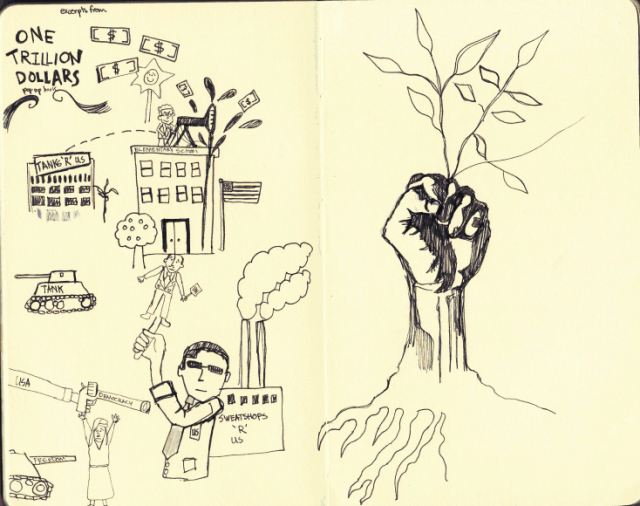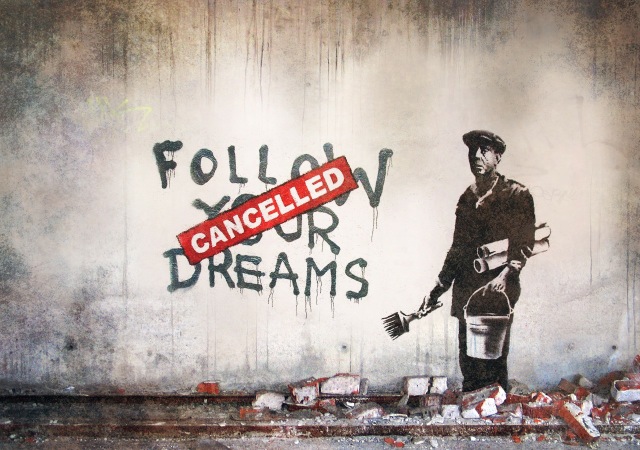Ilustration above by Banksy - all other art by Dan Zimmerman
Cognitive dissonance is the discomfort experienced when someone simultaneously holds two or more conflicting cognitions: ideas, beliefs, values or emotional reactions.
Cognitive dissonance has been on my mind for quite sometime now, consciously and subconsciously. As I look back at past writings, I find myself alluding to it in many examples that I have given to explain a point…It’s like I knew about it without knowing about it...However, one example, that has to do with happiness, keeps stumbling into my mind.
Everyone seems to believe that money will not buy happiness and that pursuing it leaves you unsatisfied, right? And everyone seems to believe friends, family, and the pursuit of passions will lead to a fulfilling life, right? Yet, our culture is in a perpetual pursuit of the former. We are a culture of cats trying to catch our uncatchable tail. But why is this?

Well, I think we do it to rest our cognitive dissonance between two conflicting ideologies: (1) a culture that forcefully promotes over spending and consumerism and (2) our own morals and values that promote friends, family, and the pursuit of passions. With these two ideologies, we settle our dissonance by choosing the “safer” option, the option that makes us look normal—the pursuit of money and luxuries. Because let’s face it, If we were actually going to pursue what we say we value, we would look foolish. We probably would not be working a full work week, which would label us as a “bum,” we probably wouldbe living in a house full of friends/family, maybe even grandparents, or maybe we would have our retched children living with us (rent free) until they’re 25 just because we enjoy their company and want them to succeed.
You may say that this claim is foolish and that people obviously value friends, family, and their passions more then the pursuit of money and possessions, but that seems blatantly false. If it were true, the workweek would not be becoming increasingly longer, peoplewouldn’t work far away from home for weeks at a time, or move away from friends and family to another city for a higher paying career. People would realize that their happiness is being suffocated for foolish things like a new car, house, T.V., couch, hardwood, or a handbag. But as the days grow longer, bank accounts grow larger and because we believe that these possessions will bring us bliss, we continue to work without protest.

We continue to work and as we work more, those who work less become viewed as lazy or foolish, whereas high-income earners are hard working and admirable people. But why is this admirable? Why is giving up the pursuits that make you happy and the loved ones that make you happy admirable? It should be shamed rather than praised, shouldn’t it?
An ideology which holds individuals self worth so close to the amount of bills in the bank is harmful and not encouraging to those attempting to live a happy life through friends, family, and following passions. It puts these people into a confused state, a state of shame for not following the consumer ideology—an ideology that I think most believe to be wrong, but due to a non-reflexive nature, and being force fed consumerism, people choose to work with it rather than against it—a work horse’s life is simple when it has its blinders on.
I have a friend named Jordan who has been upset lately, so as we were walking home from the sky train in a light rain, I asked him why. He replied that it’s because “I am 23 and have nothing—no house, no car, no impressive job, no post secondary, nothing. I feel like a failure.”

Jordan is right. He is a failure. In our culture and market he is worth very little and is not to be looked up to. As we walked Jordan and I discussed how he was a failure for quite sometime, until eventually he looked up at me and said, in a pessimistic voice, “The only thing I really have to show for myself are my friends. I have great friends that are doing awesome things…” and as soon as he said that I couldn’t help but laugh, not because I though he was a pathetic loser… but because of everything that he had said earlier which he didn’t possess; great friends seems to be the one thing that actually matters. I mean, what would you rather have, a house, a car, and a T.V, or have a group of friends that you love and respect? I think the answer is evident. However, such an attitude is not evident in our culture. The culture we’re creating leads us to believe that those things come second. As we “progress” we are finding that time spent with our family, friends, and interests are be being compromised. Compromised for something we don’t actually believe, but yet it taunts us like an oasis filled with things we don’t need.My friend Jordan is only one example of multiple people who are plagued with feeling worthless and guilty for pursuing what they enjoy, for pursuing what most people know will make us happy… So I guess my challenge to you is to not settle your dissidence with what is viewed as the norm, reflect on what you are pursuing and question whether it will really be worth it in the end.








